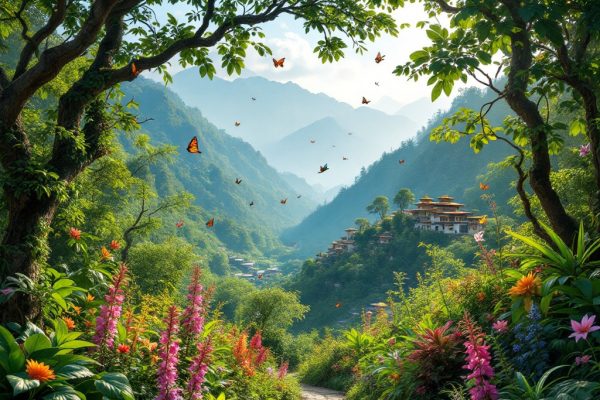Eco-Tourism and Environmental Science: Destinations to Visit
Discover the wonders of eco-tourism, where adventure meets conservation! Explore breathtaking natural areas while minimizing your environmental impact and empowering local communities. Learn about sustainable travel practices, eco-friendly accommodations, and enriching activities like wildlife observation and guided nature walks. From Costa Rica’s rainforests to Iceland’s geothermal wonders, find inspiration and plan your next eco-adventure. Start making a difference today – read on to discover how!
Important information

- Eco-tourism promotes responsible travel to natural areas, conserving the environment and improving the well-being of local communities.
- It supports conservation efforts by funding research, protecting habitats, and raising public awareness.
- Eco-tourism benefits local communities through job creation and supporting local businesses.
- Travelers learn about ecosystems and sustainable practices, minimizing their environmental impact.
- Costa Rica, Iceland, New Zealand, Kenya, Rwanda, and the Galápagos Islands are highlighted as top eco-tourism destinations.
Understanding Eco-Tourism and Its Impact
Eco-tourism promotes responsible travel to natural areas, conserving the environment and improving the well-being of local communities. It minimizes its environmental impact through sustainable accommodations and activities. At the same time, eco-tourism supports local communities by providing education and generating revenue. It also fosters a deeper understanding of the surrounding ecosystems. Eco-tourism benefits both the planet and its people.
What Is Eco-Tourism?
Ecotourism is responsible travel to natural areas that conserves the environment and improves the well-being of local people. This means minimizing our impact while empowering local communities and fostering cross-cultural respect. Furthermore, ecotourism promotes conservation by raising awareness of local ecosystems, offering a powerful way to travel responsibly.
Key Principles of Eco-Tourism
Eco-tourism minimizes environmental impact while supporting local communities and conservation. It educates travelers about local ecosystems and emphasizes sustainable practices. By investing in ecosystem conservation and promoting responsible travel to natural areas, this type of tourism benefits both the environment and its inhabitants. It offers a sustainable way to experience nature’s wonders.
How Eco-Tourism Supports Environmental Science
Ecotourism directly benefits environmental science by funding research and conservation efforts. This financial support boosts scientific understanding of ecosystems and raises public awareness about conservation. Travelers learn about conservation firsthand, while sustainable practices within the tourism industry are simultaneously supported. By minimizing harm to ecosystems and encouraging responsible travel, ecotourism helps protect the environment for future generations.
Benefits of Eco-Tourism for Nature Lovers
Eco-tourism offers a refreshing escape for nature lovers, allowing them to relax and connect with the environment while raising awareness of important environmental issues. It also supports conservation by directing funds towards protecting natural habitats and wildlife, which is crucial for preserving biodiversity. Travelers can participate in a variety of enriching activities:
- guided nature walks,
- wildlife observation tours,
- visits to conservation centers.
These opportunities educate visitors about local ecosystems and biodiversity, offering a powerful way to make a difference.
Mental Relaxation and Environmental Awareness
Eco-tourism offers a powerful way to unwind and reconnect with nature, relaxing the mind while fostering a deeper understanding of local ecosystems. It also cultivates responsibility and encourages conservation efforts, making it a trip that benefits both traveler and planet.
Supporting Conservation Efforts and Local Communities
Ecotourism directly supports conservation efforts by providing crucial funding and raising public awareness. It also benefits local communities through job creation in areas like hospitality, guiding, and craft sales. Furthermore, ecotourism promotes cultural preservation and encourages sustainable development, fostering environmental awareness among both visitors and residents. Here’s a breakdown of the key benefits:
- Supports conservation efforts: ecotourism provides crucial funding for protecting natural areas and wildlife,
- Benefits local communities: it creates jobs in hospitality, guiding, and craft sales,
- Promotes cultural preservation: ecotourism encourages respect for local traditions and customs,
- Encourages sustainable development: it fosters environmentally responsible practices within the tourism industry,
- Raises environmental awareness: ecotourism educates both visitors and residents about the importance of conservation.
Educational Opportunities in Local Ecosystems
Eco-tourism offers immersive learning experiences in local ecosystems, powerfully demonstrating the importance of biodiversity and conservation. Visitors discover sustainable travel practices, minimizing their environmental impact while gaining firsthand knowledge of local flora and fauna. They also witness the environmental challenges these ecosystems face. Eco-tourism activities such as guided nature walks, wildlife spotting tours, and visits to conservation projects provide invaluable learning opportunities.
Eco-Friendly Accommodations and Practices
Choosing an eco-friendly lodge or resort involves considering several key factors. Look for sustainable building materials and renewable energy sources. Evaluate the resort’s waste management practices. Many eco-lodges emphasize local culture and offer authentic experiences. Certifications and eco-labels can validate their commitment to sustainability.
Minimize Your Environmental Impact
- Carry a reusable water bottle.
- Avoid single-use plastics.
- Utilize public transport, cycle, or walk whenever possible.
Respect Wildlife and Local Communities
- Observe animals from a distance.
- Support local businesses by purchasing their products and services.
These actions contribute to responsible tourism.
Choosing Eco-Lodges and Resorts
Eco-lodges and resorts are dedicated to minimizing their environmental impact through various sustainable practices. These accommodations prioritize waste reduction and water conservation. They often use sustainable building materials and renewable energy sources, such as solar power. Furthermore, they frequently support local communities and contribute to conservation efforts by offering educational programs about the local ecosystem. Sourcing food locally reduces their carbon footprint and supports local farmers. When selecting an eco-lodge, consider certifications and labels that verify their commitment to sustainability. Also, weigh important factors such as location, available activities, and the lodge’s community engagement.
Key Features of Eco-lodges
- Sustainable building materials and renewable energy sources, such as solar power.
- Waste reduction and water conservation programs.
- Local sourcing of food, reducing carbon footprint and supporting local farmers.
Choosing the Right Eco-lodge
- Look for certifications and labels verifying sustainability.
- Consider the location, available activities, and community engagement.
- Support for local communities and conservation efforts through educational programs.
Implementing Sustainable Travel Practices
Pack reusable water bottles, toiletries, and shopping bags to minimize your environmental impact.
Conserve resources by taking shorter showers and turning off lights when leaving a room.
Support local communities. Buy local handicrafts, dine at local restaurants, and hire local guides to boost the local economy.
Learn basic phrases in the local language to demonstrate respect and facilitate communication.
Choose eco-friendly transportation options like walking, cycling, or public transit whenever possible.
Respect wildlife by observing animals from a distance and avoiding disruptions to their natural habitat. This is crucial for conservation efforts.
How to Engage with Local Communities Responsibly
Support local communities by purchasing handcrafted souvenirs and dining at family-owned restaurants.
Showing respect for local customs and traditions enriches the cultural exchange, perhaps even learning a few basic phrases.
Immerse yourself further by participating in exchange programs or workshops.
Community-based tourism offers another excellent way to directly benefit local people.
Top Eco-Tourism Destinations to Visit
Costa Rica is renowned for its biodiversity and commitment to sustainability.
Iceland, harnessing geothermal energy, offers incredible eco-friendly tours.
New Zealand blends thrilling eco-adventures with active conservation efforts.
Kenya prioritizes both wildlife conservation and community engagement.
Rwanda’s conservation work centers on protecting mountain gorillas.
The Galápagos Islands safeguards its unique ecosystem with strict regulations.
These destinations all share the goal of minimizing environmental impact while enriching travelers’ experiences. Imagine exploring rainforests, witnessing the Northern Lights, or tracking gorillas – these are just a few examples of how travel and conservation can coexist.
Costa Rica: A Leader in Biodiversity and Sustainable Practices
Costa Rica, a renowned biodiversity hotspot, leads the way in sustainability with over 25% of its land protected as national parks and reserves. Imagine exploring vibrant rainforests, mystical cloud forests, and breathtaking beaches—diverse ecosystems thriving under Costa Rica’s careful stewardship. The nation champions eco-tourism, promoting eco-friendly lodges. These lodges offer visitors an unparalleled opportunity to witness incredible biodiversity while minimizing their environmental impact. This creates a true win-win for both nature and travelers.
Iceland: Eco-Friendly Tours and Geothermal Energy
Iceland, a haven for eco-conscious travelers, minimizes its environmental impact through a strong commitment to geothermal energy. Explore breathtaking glaciers, geysers, and waterfalls with tours dedicated to preserving Iceland’s natural beauty. Sustainable accommodations minimize their ecological footprint, enhancing Iceland’s commitment to environmental responsibility. Enjoy unique experiences such as geothermal bathing and viewing the Northern Lights. Discover a remarkable blend of adventure and environmental responsibility in Iceland.
New Zealand: Conservation and Eco-Friendly Adventures
New Zealand is a champion of conservation, offering incredible eco-adventures amidst diverse landscapes, from fjords to snowy peaks. Sustainable tourism thrives here, with popular activities like hiking, kayaking, and wildlife viewing minimizing environmental impact while supporting local communities and conservation efforts. The country also prioritizes educating visitors about its unique ecosystems and responsible travel practices.
Eco-Adventures in New Zealand:
- Hiking, exploring trails through diverse landscapes.
- Kayaking, experiencing the beauty of fjords and coastlines.
- Wildlife viewing, observing native species in their natural habitats.
Sustainability Focus:
- Minimizing environmental impact through responsible tourism practices.
- Supporting local communities and conservation efforts.
- Educating visitors about unique ecosystems and responsible travel.
Key attractions include destinations like Fiordland National Park and areas dedicated to native species, showcasing New Zealand’s commitment to eco-tourism.
Kenya: Wildlife Conservation and Community Engagement
Kenya is renowned for its stunning wildlife and commitment to conservation, particularly through community-based tourism. Local involvement in environmental protection is key, with programs generating income and promoting sustainability. These initiatives include wildlife viewing safaris and cultural tours. Kenya’s eco-tourism model serves a dual purpose: safeguarding wildlife while empowering local communities.
Rwanda: Conservation Efforts with Mountain Gorillas
Tourism in Rwanda’s Volcanoes National Park plays a vital role in protecting endangered mountain gorillas. Revenue generated from tourism directly supports essential conservation efforts, such as anti-poaching patrols and habitat preservation. Gorilla trekking permits are a significant source of funding for these programs, benefiting both the gorillas and the local communities. The permits create employment opportunities in the tourism sector, contributing to the long-term well-being of the gorilla population and their ecosystem. This approach fosters a positive impact for both the animals and the people of Rwanda.
Galápagos Islands: Strict Conservation Regulations
The Galápagos Islands’ delicate ecosystem requires careful protection, making sustainable tourism essential. Strict limits on visitor numbers and mandatory guided tours in many areas significantly lessen tourism’s environmental footprint, safeguarding the islands’ unique flora and fauna. Regulations also govern activities like snorkeling and diving to prevent harm to coral reefs and marine life. By educating visitors about conservation and the islands’ remarkable biodiversity, the primary aim is to preserve this natural wonder for future generations. The key aspects of sustainable tourism in the Galápagos include: limiting visitor numbers to minimize environmental impact, implementing mandatory guided tours to ensure responsible behavior and educate visitors, regulating water activities like snorkeling and diving to protect marine life and coral reefs, and educating visitors about conservation and biodiversity to foster appreciation and responsible travel.
Exploring Costa Rica’s Eco-Tourism Wonders
Corcovado National Park: a biodiversity hotspot teeming with wildlife.
Arenal Volcano National Park: explore volcanic landscapes and geothermal springs.
Monteverde Cloud Forest: a birdwatcher’s paradise with a unique cloud forest ecosystem.
Manuel Antonio National Park: discover diverse flora and fauna where rainforest meets ocean.
Tortuguero National Park: experience remote wilderness and witness turtle nesting.
Corcovado National Park: Biodiversity Hotspot
Costa Rica’s Corcovado National Park is a vibrant ecosystem teeming with biodiversity. Visitors can spot incredible wildlife, including monkeys, tapirs, and jaguars. Popular activities such as camping and guided tours offer exciting ways to experience the park. Access is limited to minimize environmental impact and preserve this natural wonder.
Monteverde Cloud Forest: Bird Watching Paradise
The Monteverde Cloud Forest, a biological preserve, attracts birdwatchers worldwide. It boasts over 400 bird species, including the resplendent quetzal. Its unique cloud forest ecosystem fosters incredible biodiversity, making Monteverde a prime ecotourism destination and a must-see for nature enthusiasts.
Arenal Volcano National Park: Geothermal Springs Experience
Arenal Volcano National Park in Costa Rica is famous for its naturally heated hot springs. Here, visitors can unwind in the soothing mineral-rich waters surrounded by lush rainforest, with the majestic Arenal Volcano providing a breathtaking backdrop. This unique and rejuvenating experience is a direct result of the volcano’s geothermal activity.
Manuel Antonio National Park: Rich Flora and Fauna
Manuel Antonio National Park in Costa Rica is a wonderland where vibrant rainforest meets pristine beaches. The park is teeming with diverse wildlife, both on land and below the waves in its vibrant coral reefs, all within a remarkably compact area. Visitors can spot sloths, monkeys, iguanas, and a variety of bird species.
Tortuguero National Park: Adventure in Remote Wilderness
Embark on an unforgettable adventure to Tortuguero National Park, accessible only by boat or plane. Explore the intricate network of canals by canoe or kayak, immersing yourself in a thriving ecosystem teeming with diverse wildlife. Encounter caimans, monkeys, and a breathtaking array of over 300 bird species. Tortuguero holds a special distinction as a vital nesting site for green and leatherback turtles, making it a truly remarkable destination for nature enthusiasts.













